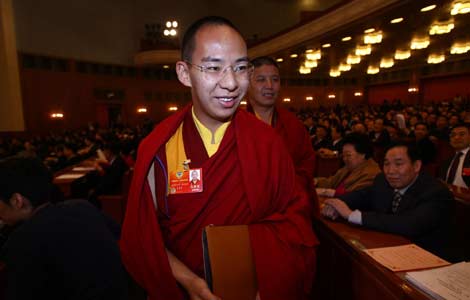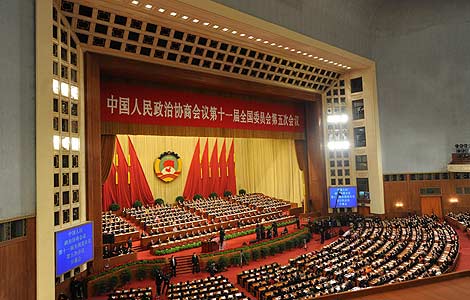High living costs top concern
Updated: 2012-03-03 20:48
(Xinhua)
|
|||||||||
Their expectations are well-justified. China's Consumer Price Index (CPI) grew by 5.4 percent year-on-year in 2011, while its benchmark Shanghai Composite Index has fallen below 2,500 points, a dramatic drop from its peak of 6,000-plus points several years ago. Although market cooling measures have helped to rein in the cost of housing in urban China, many low- and middle-income Chinese still believe affordable housing is beyond their reach.
"Vegetable prices are still too high. If the prices of some vegetables keep growing, I will not buy them at all," said Fang Gui, a 65-year-old retiree and resident of Xi'an, capital of northwest China's Shannxi Province.
The lives of higher-income groups are being affected by higher prices as well. Liu Mingbing is a mid-level manager in southwest China's Chongqing municipality. "Nearly all of my monthly income is spent on living expenses, commuting, my child's education and housing management fees. I can barely save any money now," he said.
Since the beginning of last year, government departments at all levels have been rolling out various measures to curb price increases while simultaneously working to offset the impact on low-income groups by issuing subsidies.
However, surveys on major websites show that "stabilizing consumer prices" has been a major concern for the Chinese public ahead of the annual sessions of the National People's Congress (NPC) and the Chinese People's Political Consultative Conference (CPPCC), China's top legislature and political advisory body, respectively. The CPPCC session opened on Saturday.
Housing prices have also aroused public concern. In 2010, the government began to cool down the skyrocketing housing market with tightening measures that applied to land sales, finance and taxation. Although prices have dropped in many cities since then, buying an apartment remains a daunting challenge for many ordinary Chinese.
"I definitely could not afford to buy an apartment two years ago. I earn about 4,000 yuan (634 U.S. dollars) a month, but the average price is over 10,000 yuan per square meter. The prices have been falling, but are still higher than my expectations," said Zhang Kai, a white-collar worker from the city of Nanjing in east China's Jiangsu province.
Gu Yunchang, vice president of the China Real Estate Association, said the government's fine-tuning efforts have entered a "crucial stage," adding that any policy-loosening could risk wasting previous efforts.
It is plausible for prices of consumer goods and housing to increase along with the country's rapidly growing economy. However, China's stock market remains a puzzle to most, as it has continued to fall despite the booming economy.
"The stock index has jumped from 6,000 points to 2,000 points. I have been investing in stocks for years, but I am still locked up right now. The current value of my stocks is less than half what it was when I bought them. Tens of thousands of hard-earned yuan has been lost," said Dai Suigang, an individual investor.
In a stock market where individuals account for about 80 percent of all investors, Dai and other investors who have lost large amounts of money are bewildered by the fact that the economy and stock market are appearing to move in opposite directions.
Guo Shuqing, the recently appointed chairman of the China Securities Regulatory Commission (CSRC), said China's capital market is still immature, but is also full of vitality and has great potential.
He said the CSRC will prioritize the protection of investor interests and work hard to improve the market environment and investment culture.
"A more regulated, stable and healthy stock market is the hope of many investors. This requires the government to create more directed, innovative and forceful policies," said Qin Xiaobin, an analyst for Galaxy Securities.
Premier Wen Jiabao will outline priorities for the government's agenda in a government work report to be delivered on Monday, when the NPC's annual session will begin.
Now all the eyes are on the NPC annual session opening on Monday, when Premier Wen will outline priorities in the government's agenda for this year in a government work report.
The report is expected to focus on issues pertaining to improving people's livelihoods, as a statement issued by the Political Bureau of the Communist Party of China (CPC) Central Committee after their February 20 review of a draft of the report said more efforts will be made to coordinate economic growth and the improvement of livelihoods.
Hot Topics
Wu Ying, iPad, Jeremy Lin, Valentine's Day, Real Name, Whitney Houston, Syria,Iranian issue, Sanyan tourism, Giving birth in Hong Kong, Cadmium spill, housing policy
Editor's Picks

|

|

|

|

|

|







